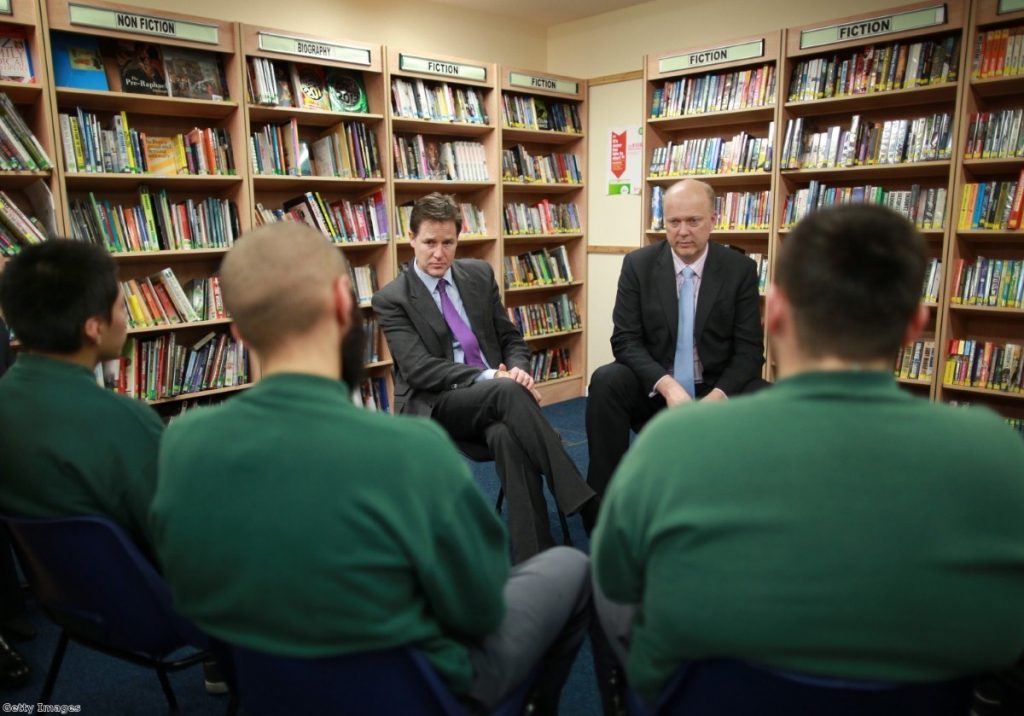Prison governors: Grayling’s regime is driving us to ‘tipping point’
Chris Grayling's "Spartan" prison regime is leading to a "tipping point" of instability, the president of the Prison Governors' Association has warned.
In a highly embarrassing intervention for the justice secretary, Eoin McLennan-Murray warned that the Incentives and Earned Privileges (IEP) scheme was triggering an increase in assaults and suicides behind bars.
"In order to run a safe, decent prison it is vital to have the co-operation of the majority of prisoners," he said.
"This relationship is underpinned by staff having legitimacy in the eyes of prisoners and this is dependent on trust and transparency in decision making.


"Some of the recent changes to the IEP system have undermined this trust and threaten the legitimacy of decisions made by staff.
"If this is allowed to continue unchecked then a tipping point may be reached whereby prisons are more likely to become unstable than stable.
"We are already seeing the early signs of this with rising levels of assaults, reportable incidents and a disturbing rise in self inflicted deaths."
The IEP scheme has been criticised across the political spectrum for the ban it places on all parcels being sent to prisoners. The inclusion of books in the ban sparked a protest campaign by the Howard League for Penal Reform and English PEN.
The regime also limits family contact and opportunities for education and learning – all factors which have been shown to reduce people's risk of reoffending.
IEP contains a number of other draconian measures. It makes it much harder for inmates to secure 'enhanced' status in prison, where they are granted certain creature comforts, and much easier for them to drop down a status level.
It is thought to have significantly increased the number of people on 'basic' regime, where they are kept alone in a cell for most of the day and denied any personal property.
For more information on life on 'basic' click here
Since the new regime was introduced last November, the number of suicides in prison has doubled compared to the same period a year ago.
McLennan-Murray made the comments in response to a Prison Reform Trust briefing highlighting the effect of the policy on prisoners and staff.
Letters and phone calls from prisoners to the trust have nearly trebled since IEP was introduced last November.
"The legitimacy of prison regimes risk being undermined by low staffing levels, new mean and petty restrictions and a developing culture of punishment without purpose," Mark Day of the Prison Reform Trust wrote in an article for Monitor magazine.
"Changes to prison rules are eliciting a strong sense of injustice in prisons and undermining opportunities for effective rehabilitation."
The trust's briefing quotes one prisoner who was prevented from undertaking a distance learning course because of the restrictions on parcels.
"I am about to start a distance learning course. A friend of mine has done all these courses and is fully qualified and was going to send me all his books but we can't have books sent in anymore," the inmate said.
Another said: "The prison service/government keep saying how important it is to maintain family ties. So they put phone prices up, send us miles away from our families and stop us from having stamps and writing materials posted in.
"My partner used to send them all in for me so we can all stay in touch as much as possible and that has now come to a sudden stop and now my daughter wants to know why her daddy can’t write to her anymore.
"I know that if I lose my family because of this lack of contact, it will be straight back to square one and I know I will go straight back to crime as I’ll have nothing left to lose."
A mother of a prisoner told a recent meeting of the all-party parliamentary penal affairs group: "We have heard a lot about the ban on books in recent weeks. But this is the one tangible link you can have with your family: 'I thought you might enjoy this – I did' or 'a few crosswords to keep you busy'.
"This prohibition isn’t only about reducing opportunities for learning. It also removes the last possibility of a gift, a tangible piece of human warmth."
Grayling's new rules mean prisoners must be able to show they are engaged in "purposeful activity" in order to stay on enhanced level, but the chief inspector of prisons has highlighted that opportunities for activity in prison have plummetted. This has led to many prisoners being downgraded through no fault of their own.
One disabled prisoner who was dependant on his carer told the Prison Reform Trust he had been downgraded from enhanced states because he was not "helping others".
Prisoners who were about to drop down a status level used to have the opportunity to make representations to the prison authorities. Now it is the decision of a single senior prison officer.
Another prisoner said: "From being a settled lifer, working years to gain trust and respect from a difficult enough system, I find myself regarded as nothing.
"The basic regime is inhumane; it will give me just over an hour out of my cell.
"For years I have contributed to our community, always worked. My behaviour has been impeccable and I have mentored many inmates in several fields. Now in one fell swoop Chris Grayling has taken everything from me."
Grayling receieved a letter from leading British authors, the Howard League and English PEN about the parcel ban in which they asked for a meeting to discuss their concerns, but he has not replied.









